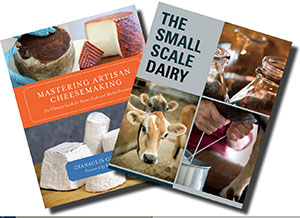An Interview with noted author and cheesemaker, Gianaclis Caldwell
Have you ever wondered what it takes to run a small scale dairy farm? And, make a living doing something you love?

Gianaclis Caldwell, goat dairy farmer and author of The Small-Scale Dairy and Mastering Artisan Cheesemaking talks about running a small dairy farm operation and how she ended up becoming a raw goat milk cheese producer.
When you look at the economics, Caldwell warns, the decision to make raw milk artisan cheese has more to do with a desire for a certain lifestyle than making money. Citing Washington State as an example (each state has different laws, and raw milk prices will vary) a gallon of raw milk may range from $14 to upwards of $20 per gallon. A gallon of milk will produce about a pound of cheese. Caldwell says, “that makes it difficult for cheesemakers to buy milk when there’s a good market for fluid milk” because that’s too expensive to buy for making artisan cheese.
In this interview, Gianaclis Caldwell talks about some of the following topics:
- Deciding whether to raise cows or goats
- Running a small farm as a business
- Cost considerations for running a small-scale dairy
- What makes for a superior milk
- Raw vs. pasteurized milk
- Overall benefits
[products ids=”41488,41503,41849″]
In 2005, Gianaclis, along with her husband and children, purchased a 25 acre portion of her family’s original 220-acre Oregon homestead to start Pholia Farm Creamery and Dairy.
Although Caldwell says that she has around 30 Nigerian Dwarf Goats that are milked on the farm, the total number is as high as 70. She doesn’t hold an exact count as the number varies constantly: there are young ones that have not been bred yet, bucks and retired goats, she explains.
Pholia Farm Creamery and Dairy produces only raw milk aged cheeses. In order to sell at retail stores, raw milk cheese must be aged a minimum of 60 days, though her cheeses age for longer periods, between 4 to 13 months, depending upon the variety.
More small-scale dairy operations are springing up across the country, and recently during a cheesemaking class that she was teaching, Caldwell says, “these avid home cheesemakers were buying their milk from local people and talking about who they get their milk from, and that’s an important connection to the land and to the food”.
This interview was filmed at Steve Jones’s Cheese Bar in Portland, Oregon.
Most of the videos featured on Cooking Up a Story were produced, filmed, and edited by Rebecca Gerendasy. Fred Gerendasy contributed as a writer to many of the posts and occasionally as the interviewer. Visit Rebecca Gerendasy Clay – Art and Fred Gerendasy Photography to see their current work.
